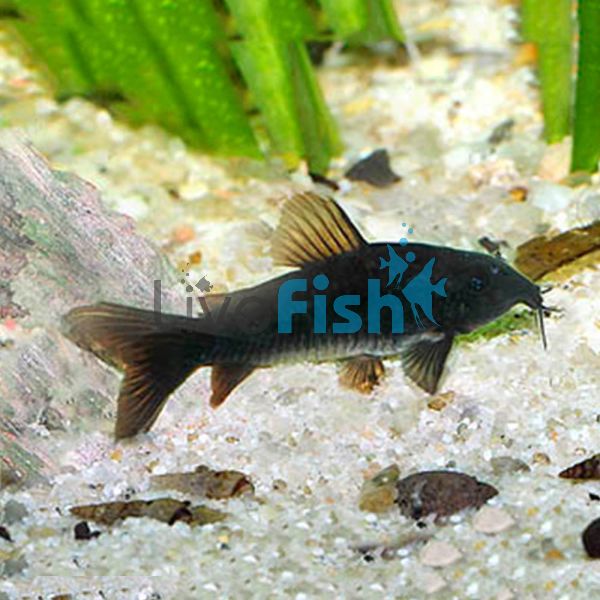Black Corydoras 3cm
Corydoras or commonly called cories are a staple fish for any tropical community aquarium, they are hardy, super active and have tonnes of benefits as well. The Corydoras family has hundreds of different species of all different shapes, colours and sizes. One of these is the incredibly popular Black Corydoras. Though these fish may be considered bland in colour the black Corydora is a rousingly popular species amongst aquarists due to their almost jet black colour with a light underbelly.
- Buy 5 for $23.14 each and save 10%
- Buy 10 for $20.57 each and save 20%
Black Corydoras
Corydoras or commonly called cories are a staple fish for any tropical community aquarium, they are hardy, super active and have tonnes of benefits as well. The Corydoras family has hundreds of different species of all different shapes, colours and sizes. One of these is the incredibly popular Black Corydoras. Though these fish may be considered bland in colour the black Corydora is a rousingly popular species amongst aquarists due to their almost jet black colour with a light underbelly.
This naturally occurring barb black colour is difficult to come amongst Corydoras which are generally a lighter colour, the closest would be a bronze Cory which is often brown than black. The Black Corydoras is often regarded as the upgraded bronze as from head to tail it is a pitch-black colour with a hint of coffee brown in the fins. It also has an almost grey underbelly which gives a subtle contrast to the overall body colour. One of the greatest benefits to all corydoras is their habit to constantly stir the substrate layer, they act like mini bulldozers sometimes shoving their entire face into the sand bed searching for food which in turn makes sure it is stays turned over.
They are also bottom-dwelling fish and are an awesome option to add some life to the bottom of the tank. They are not shy fish and are constantly actively making them a great and popular fish for community and planted aquariums, Black corydoras are also considered to be schooling catfish, in the wild they are often seen in groups of a few hundred however in the home aquarium it is recommended to keep at least 3 or more. An ideal school would be around 6 plus individuals to really make them feel comfortable and to add some activity to the tank. The clack corydoras are incredibly peaceful and remain fairly small at 7cm max.
They are also bred fairly easy in captivity where they will scatter eggs often on the aquarium glass resulting in a fun breeding project. differentiating males and females are possible where the males are often smaller and narrower compared to the larger-bodied females. However, the best method to identify is to get a pack of 4-6 Corydoras and let a pair naturally form. The wild origin of the black corydoras is South America.
Tank Recommendations for your Black Corydoras
Being a small catfish, black corydoras can be kept in smaller aquariums however the minimum would be around 60 litres (20 gallons). This ensures that there is enough space for a school of Corydoras along with any other tank mates. A sand substrate is best as coarser substrates like gravel often result in Corydoras damaging their barbels. The Black Corydoras especially would look amazing against a light coloured substrate as their dark colour would contrast incredibly. However, to best replicate their natural habitat using a more natural dark orange sand with medium to large-sized river stones would be best. They also plant safe and thrive in a well-planted aquarium. Larger leafed plants such as amazon swords also allow for great egg-laying surfaces. The leaves with eggs can be pinched out of the aquarium and raised separately.
Suitable Tank Buddies
Black Corydoras are an incredibly peaceful fish that can be kept with an absolutely massive range of community aquariums. They do not display any aggression if when breeding and make for a perfect addition even with sensitive or shy fish. They also make for great dither fish allowing for potentially shy tank mates to display themselves more. The only factor which should be considered is that Corydoras are almost exclusively a bottom-dwelling species which means that any super active or large top dwelling fish may outcompete the corydoras for food.
Usually Compatible
community fish such as rams, tetras, angelfish, discus, rainbow fish and many many more.
Sometimes Compatible
Larger peaceful South American cichlids such as Uaru, Severums and other fish may out-compete them as they are mostly bottom-dwelling fish.
Rarely Compatible
Large and aggressive species such as the Oscars may prey on the Corydoras. This is especially important as Corydoras have spines on their pectoral fins like many catfish, this can result in both the corydoras and the predator fish’s death.
Feeding your Black Corydoras
Black cories are very easy to feed. They will take a wide range of pellets, flakes and frozen foods. Just like any fish though they should be fed a varied diet with a mix of different foods. The ideal diet would be a good quality micro slow sinking pellet or crushed flake, supplemented with frozen bloodworms or black worms or even live foods like baby brine shrimp or micro worms.
| Scientific Name | Corydoras schultzei |
|---|---|
| Care Level | Easy |
| Common Names | schultzei Corydoras, Black Corydoras, Black Venezuelan corydora, Venezuelan corydora. |
| Diet | Omnivore |
| Fish Family | Callichthyidae |
| Lifespan (years) | 10 |
| Max. Length (cm) | 7 |
| Min. Tank Volume (l) | 60 Liters |
| Origin | South America |
| Reef Safe | Yes |
| Sociability | Peaceful |
| Venomous | No |
| Water Conditions | 24-26° C (75.2-79° F), pH 5.0-7.0 |




